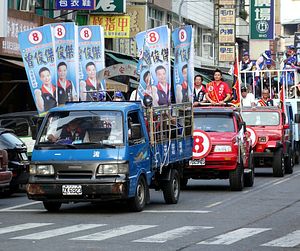The ruling Kuomintang was handed an unexpected and major defeat in Taiwan’s 9-in-1 local elections last month. Many foreign media commentaries are naming cross-Strait relations as the predominate factor in this election result. I profoundly disagree.
The Diplomat has two recent articles holding this view. Kerry Brown points out that the people of Taiwan gave the KMT a failing grade for its pragmatic cross-Strait polices. Meanwhile, Barclay Bram Shoemaker thought that KMT’s major defeat was an aftereffect of Beijing’s reckless suppression of Hong Kong’s “Occupy Central” protest. Both views are guilty of oversimplifying the election processes and do not reflect the reality.
In fact, President Ma Ying-jeou’s cross-Strait policies were not a campaign issue in this election at all, and were not even discussed in any local constituencies. Apparently, the opposition Democratic Progressive Party (DPP) chairperson and candidates avoided these issues for campaign strategy purposes. Wu Jaushieh, the DPP’s secretary-general, also openly denied in Washington, D.C. in early December that the election outcome had anything to do with cross-Straits relations.
In the final two weeks, the KMT took the strategic step of discussing the economic impact for Taiwan of the signing of the Korea–Mainland China Free Trade Agreement, to remind voters of the difference between cross-Strait economic prospects under the two major parties. But the DPP deliberately evaded the issue. Many KMT-friendly voters concerned about the economy still chose to stay home on the Election Day, perhaps demonstrating their dissatisfaction with the government’s domestic policies. This may explain why many KMT strongholds in northern Taiwan saw very low voter turnouts. It also surely suggests there is little basis to make the argument that the election outcome was a referendum of the KMT’s cross-Strait policies.
Likewise, the perspective of seeing Taiwan in the mirror of Hong Kong is rather arbitrary. Since the outbreak of democratic protests in Hong Kong last September, a number of foreign media have been keen to compare the two. But this is comparing apples and oranges. Hong Kong does not mirror Taiwan, because Taiwan does not need to see Hong Kong in its destiny.
The reason is simple: Mainland China has promised Hong Kong “one country two systems,” which has never been an option for the people of Taiwan. Twenty official surveys on Taiwan’s future since 2008 have shown that more than 80 percent of the public support the status quo. In other words, the “one country two systems” model has very little support in Taiwan.
After all, Taiwan and Hong Kong are fundamentally different. After British colonization, Hong Kong became Mainland China’s Special Administrative Zone. Having never enjoyed sovereignty, Hong Kong people feel the need to demand democracy from Beijing. Yet the Republic of China (Taiwan) is a sovereign state with its own constitution, president, legislature, and armed forces. It is one of the most vibrant democracies in Asia. Why should the people of Taiwan see Hong Kong as its mirror?
Beijing has unfortunately gone back on a promise made 17 years ago for genuine universal suffrage in Hong Kong. This action has caused considerable resentment in Taiwan. Ma made several public statements in favor of greater democracy in Hong Kong. But these factors had no bearing on the local election result, which certainly did not represent a rejection or punishment of KMT’s cross-Strait rapprochement. Any suggestion otherwise is absurd. Few if any local Taiwanese commentators made the connection.
And what of the question many ask about Taiwan in the post-2016 period: Will the island return to its past as an East Asian flashpoint? Obviously, this question cannot be answered in Hong Kong’s elections or in Beijing’s manipulation of Hong Kong’s democratization. The answer can only depend on Taiwan itself. In particular, if the DPP regains power in 2016, how hard will it push for Taiwan’s de jure independence and how will Beijing react? Without doubt, this will be a hot topic next year during Taiwan’s presidential campaign.
Charles I-hsin Chen (PhD, London) is the Spokesperson and Director of International Affairs Department of the ruling Kuomintang in Taiwan.
An earlier version of this piece misspelled the name of the DPP secretary-general. The Diplomat regrets the error.

































